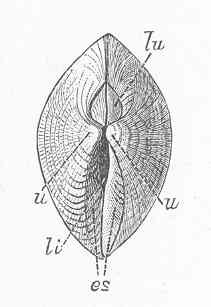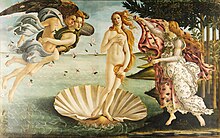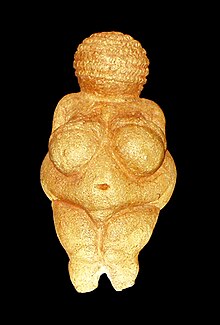Venus
Translingual[edit]


Etymology[edit]
Latin, after Venus (“goddess of beauty, love, sexual intercourse”). See images.
Proper noun[edit]
Venus f
- A taxonomic genus within the family Veneridae – typical venus clams.
Hypernyms[edit]
- (genus): Eukaryota – superkingdom; Animalia – kingdom; Bilateria – subkingdom; Protostomia – infrakingdom; Spiralia – superphylum; Mollusca – phylum; Bivalvia - class; Autobranchia - subclass; Heteroconchia - superorder; Venerida - order; Veneroidea - superfamily; Veneridae - family
Hyponyms[edit]
- (genus): Venus verrucosa (warty venus) - type species; for other species see
 Venus on Wikispecies.Wikispecies
Venus on Wikispecies.Wikispecies
References[edit]
 Venus (genus) on Wikipedia.Wikipedia
Venus (genus) on Wikipedia.Wikipedia  Venus on Wikispecies.Wikispecies
Venus on Wikispecies.Wikispecies  Category:Venus (genus) on Wikimedia Commons.Wikimedia Commons
Category:Venus (genus) on Wikimedia Commons.Wikimedia Commons - Venus at National Center for Biotechnology Information
- Venus at World Register of Marine Species
- Venus at Integrated Taxonomic Information System.
- Venus at Encyclopedia of Life
English[edit]

Etymology[edit]
From Middle English Venus, from Latin Venus.
Pronunciation[edit]
- (UK) IPA(key): /ˈviːnəs/
- (US) IPA(key): /ˈvinəs/, [ˈvinɪ̈s]
- (Ghana) IPA(key): [ˈvɛ.nɐs]
audio (US) (file) - Rhymes: -iːnəs
- Homophones: venus, venous
- Hyphenation: Ve‧nus
Proper noun[edit]
Venus (plural Venuses)
- (astronomy) The second planet in the Solar system, named for the goddess; represented in astronomy and astrology by ♀.
- The Illustrated London Almanack 1867, London, page 45:
- Venus rises on the 1st day 1/4 to 5 a.m., and 4h. 25m. a.m. on the last day. [...] She is now beginning to move northward. [...]
- The Illustrated London Almanack 1867, London, page 45:
- (Roman mythology) The goddess of love, beauty, fertility, and sexuality; the Roman counterpart of Aphrodite.
- 1888 June 2, “Senoritas of Brazil. [Chicago Mail.]”, in The Cincinnati Enquirer, volume XLVI, number 154, page 13, column 3:
- Their figures are universally models for brunette Venuses, and their feet arch like rainbows, and are Cinderellian in size.
- A female given name
Synonyms[edit]
- (astronomy, astrology): ♀
Derived terms[edit]
- crocus of Venus
- mons Venus
- protoVenus
- salt of Venus
- venereal
- Venerial
- Venerian
- Venus' comb
- Venus comb, Venus' comb, Venus's comb
- Venus flytrap
- Venusian
- Venuslike
- Venus mound
- venusquake
- Venus's basin
- Venus's basket
- Venus's bath
- Venus's flower basket
- Venus's girdle
- Venus's hair
- Venus's hair stone
- Venus's looking-glass
- Venus's pride
- Venus's purse
- Venus's shell
- Venus zone
Translations[edit]
|
|
See also[edit]
- (planets of the Solar System) planets of the Solar System; Mercury, Venus, Earth, Mars, Jupiter, Saturn, Uranus, Neptune
| Solar System in English · Solar System (layout · text) | ||||||||||||||||||
|---|---|---|---|---|---|---|---|---|---|---|---|---|---|---|---|---|---|---|
| Star | Sun | |||||||||||||||||
| IAU planets and notable dwarf planets |
Mercury | Venus | Earth | Mars | Ceres | Jupiter | Saturn | Uranus | Neptune | Pluto | Eris | |||||||
| Notable moons |
— | — | Moon | Phobos Deimos |
— | Io Europa Ganymede Callisto |
Mimas Enceladus Tethys Dione Rhea Titan Iapetus |
Miranda Ariel Umbriel Titania Oberon |
Triton | Charon | Dysnomia | |||||||
Noun[edit]

Venus (countable and uncountable, plural Venuses)
- (obsolete or poetry) Sexual activity or intercourse, sex; lust, love.
- 1624, Democritus Junior [pseudonym; Robert Burton], The Anatomy of Melancholy: […], 2nd edition, Oxford, Oxfordshire: Printed by John Lichfield and James Short, for Henry Cripps, →OCLC:, II.ii.2:
- Immoderate Venus in excess, as it is a cause, or in defect; so, moderately used, to some parties an only help, a present remedy.
- (obsolete, alchemy, chemistry) Copper (a reddish-brown, malleable, ductile metallic element).
- 1807, A New and Complete Encyclopaedia; or, Universal Dictionary of Arts and Sciences: Vol III[2], page 48:
- CRYSTALS of Venus or of copper, called also vitriol of Venus, is copper reduced into the form of vitriol by spirit of nitre, or by dissolving verdegris in good distilled vinegar, till the acid be saturated; it is very caustic and used to eat off proud flesh. It is also used by painters, and manufacturers, and sold under the name of distilled vinegar. See CHEMISTRY.
- 2004, Maurice P. Crosland, Historical Studies in the Language of Chemistry[3], page 89:
- Another pair of terms which caused some confusion were Spirit of Saturn and Spirit of Venus, names suggesting compounds of lead and copper respectively. Jean Beguin described the preparation from minium and distilled vinegar of a liquid he called burning spirit of Saturn, e cause it was inflammable and he thought it was a compound of lead. Actually the lead takes no part in the reaction and the product of distilling lead acetate is impure acetone. Beguin’s terminology did not go without comment however, for Christopher Glaser later referred to ‘A burning Spirit of Saturn (as it is called) but rather, a Spirit of the Volatile Salt of Vinegar’. Tachenius referred to the product of distillation of copper acetate as ‘pretended spirit of Venus’ because it was really only distilled vinegar - the meaning which Macquer gave to the expression. It is typical of the confusion of terminology in early chemistry that the London Pharmacopoeia of 1721 gave the name Spiritus Veneris to sulphuric acid obtained by the distillation of copper sulphate.
- 2013, John Read, From Alchemy to Chemistry[4]:
- The association of the heavenly bodies with known metals and also with human organs and destinies goes back to ancient Chaldea, the land of astrologers. In Chaucer’s words: ‘The seven bodies eek, lo hear anon. Sol gold is, and Luna silver we declare; Mars yron, Mercurie is quyksilver; Saturnian leed; and Jubitur is tyn, and Venus coper, by my fathers kyn.’ […] Corresponding names were bestowed upon salts of these metals by the alchemists, and some of them have persisted down to the present day. Some examples are lunar caustic (silver nitrate); vitriol of Venus (copper sulphate); sugar of Saturn (lead acetate); and vitriol of Mars, or Martial vitriol (ferrous sulphate).
- Any Upper Palaeolithic statuette portraying a woman, usually carved in the round.
- 1986, Brian Hayden, “Old Europe: sacred matriarchy or complementary opposition?”, in Anthony Bonanno, editor, Archaeology and Fertility Cult in the Ancient Mediterranean: Papers Presented at the First International Conference on Archaeology of the Ancient Mediterranean, University of Malta, 2–5 September 1985, Amsterdam: B.R. Grüner Publishing Co., →ISBN, section I (Prehistory), page 23:
- While the goddess statues obviously did function in a very public, domestic context, there is no evidence that they were androgynyous or that they were the primary cult of importance. There are probably just as many phalli in the Paleolithic as there are Venuses.
- 1990, D. Bruce Dickson, “An Interpretation”, in The Dawn of Belief: Religion in the Upper Paleolithic of Southwestern Europe, Tucson, Ariz.: The University of Arizona Press, published 1996, →ISBN, page 211:
- However, a number of well-crafted studies in recent years have forcefully questioned—and perhaps refuted—the view that the Venuses were simply or solely goddesses.
- 2016, Jean Clottes, “Perceptions of the World, Functions of the Art, and the Artists”, in Oliver Y. Martin, Robert D. Martin, transl., What Is Paleolithic Art?: Cave Paintings and the Dawn of Human Creativity, Chicago, Ill., London: The University of Chicago Press, →ISBN, page 148:
- Her proportions, the stylistic elements, the choice of anatomical elements represented are characteristic of the Aurignacian or Gravettian Venuses, known especially from the statuary of Central and Eastern Europe.
Anagrams[edit]
Afrikaans[edit]
Etymology[edit]
Pronunciation[edit]
- Hyphenation: Ve‧nus
Proper noun[edit]
Venus
See also[edit]
- (planete van die Sonnestelsel) planete van die Sonnestelsel; Mercurius, Venus, Aarde, Mars, Jupiter, Saturnus, Uranus, Neptunus
Asturian[edit]
Pronunciation[edit]
Proper noun[edit]
Venus f
- Venus (planet)
Catalan[edit]
Pronunciation[edit]
Proper noun[edit]
Venus f
See also[edit]
- (planets of the Solar System) planetes del sistema solar; Mercuri, Venus, Terra, Mart, Júpiter, Saturn, Urà, Neptú
Cebuano[edit]
Etymology[edit]
From English Venus, from Latin.
Pronunciation[edit]
Proper noun[edit]
Venus
- the second planet in our solar system after Mercury
- (Roman mythology) the goddess of love, beauty, and natural productivity;
- a female given name from Latin
Danish[edit]
Proper noun[edit]
Venus
- Venus (planet)
See also[edit]
(planets of the solar system) planeter i solsystemet; Merkur, Venus, Jorden/jorden, Mars, Jupiter, Saturn, Uranus, Neptun [edit]
Dutch[edit]
Pronunciation[edit]
Audio (file)
Proper noun[edit]
Venus f
- Venus (planet)
Estonian[edit]
Proper noun[edit]
Venus
- Venus (Roman goddess)
Faroese[edit]
Proper noun[edit]
Venus f
- Venus (planet)
See also[edit]
| Solar System in Faroese · Sólskipanin (layout · text) | ||||||||||||||||||
|---|---|---|---|---|---|---|---|---|---|---|---|---|---|---|---|---|---|---|
| Star | Sólin | |||||||||||||||||
| IAU planets and notable dwarf planets |
Merkur | Venus | Jørðin | Mars | [Term?] | Jupiter | Saturn | Uranus | Neptun | Pluto | Eris | |||||||
| Notable moons |
— | — | Mánin | Phobos Deimos |
— | Io Europa Ganymedes Callisto |
[Term?] [Term?] [Term?] [Term?] [Term?] Titan [Term?] |
[Term?] [Term?] [Term?] [Term?] [Term?] |
Triton | Charon | Dysnomia | |||||||
Finnish[edit]
Etymology[edit]
Pronunciation[edit]
Proper noun[edit]
Venus
Declension[edit]
| Inflection of Venus (Kotus type 39/vastaus, no gradation) | ||||
|---|---|---|---|---|
| nominative | Venus | — | ||
| genitive | Venuksen | — | ||
| partitive | Venusta | — | ||
| illative | Venukseen | — | ||
| singular | plural | |||
| nominative | Venus | — | ||
| accusative | nom. | Venus | — | |
| gen. | Venuksen | |||
| genitive | Venuksen | — | ||
| partitive | Venusta | — | ||
| inessive | Venuksessa | — | ||
| elative | Venuksesta | — | ||
| illative | Venukseen | — | ||
| adessive | Venuksella | — | ||
| ablative | Venukselta | — | ||
| allative | Venukselle | — | ||
| essive | Venuksena | — | ||
| translative | Venukseksi | — | ||
| abessive | Venuksetta | — | ||
| instructive | — | — | ||
| comitative | See the possessive forms below. | |||
| Possessive forms of Venus (Kotus type 39/vastaus, no gradation) | ||||||||||||||||||||||||||||||||||||||||||||||||||||||||||||||||||||||||||||||||||||||||||||||||||||||||||||||||||||||||||||||||||||||||||||||||||||||||||||||||||||||||||||||||||||||||||||||||||||||||||||||||||||||||||||||||||||||||||||||||||||||||||||||||||||||||||||||||||||||||||||||||||||||||||||||||||||||||||||||||||||||||||||||||||||||||||||||
|---|---|---|---|---|---|---|---|---|---|---|---|---|---|---|---|---|---|---|---|---|---|---|---|---|---|---|---|---|---|---|---|---|---|---|---|---|---|---|---|---|---|---|---|---|---|---|---|---|---|---|---|---|---|---|---|---|---|---|---|---|---|---|---|---|---|---|---|---|---|---|---|---|---|---|---|---|---|---|---|---|---|---|---|---|---|---|---|---|---|---|---|---|---|---|---|---|---|---|---|---|---|---|---|---|---|---|---|---|---|---|---|---|---|---|---|---|---|---|---|---|---|---|---|---|---|---|---|---|---|---|---|---|---|---|---|---|---|---|---|---|---|---|---|---|---|---|---|---|---|---|---|---|---|---|---|---|---|---|---|---|---|---|---|---|---|---|---|---|---|---|---|---|---|---|---|---|---|---|---|---|---|---|---|---|---|---|---|---|---|---|---|---|---|---|---|---|---|---|---|---|---|---|---|---|---|---|---|---|---|---|---|---|---|---|---|---|---|---|---|---|---|---|---|---|---|---|---|---|---|---|---|---|---|---|---|---|---|---|---|---|---|---|---|---|---|---|---|---|---|---|---|---|---|---|---|---|---|---|---|---|---|---|---|---|---|---|---|---|---|---|---|---|---|---|---|---|---|---|---|---|---|---|---|---|---|---|---|---|---|---|---|---|---|---|---|---|---|---|---|---|---|---|---|---|---|---|---|---|---|---|---|---|---|---|---|---|---|---|---|---|---|---|---|---|---|---|---|---|---|---|---|---|---|---|---|---|---|---|---|---|---|---|---|---|---|---|---|---|---|---|
| ||||||||||||||||||||||||||||||||||||||||||||||||||||||||||||||||||||||||||||||||||||||||||||||||||||||||||||||||||||||||||||||||||||||||||||||||||||||||||||||||||||||||||||||||||||||||||||||||||||||||||||||||||||||||||||||||||||||||||||||||||||||||||||||||||||||||||||||||||||||||||||||||||||||||||||||||||||||||||||||||||||||||||||||||||||||||||||||
Derived terms[edit]
See also[edit]
| Solar System in Finnish · Aurinkokunta (layout · text) | ||||||||||||||||||
|---|---|---|---|---|---|---|---|---|---|---|---|---|---|---|---|---|---|---|
| Star | Aurinko | |||||||||||||||||
| IAU planets and notable dwarf planets |
Merkurius | Venus | Maa (Tellus) | Mars | Ceres | Jupiter | Saturnus | Uranus | Neptunus | Pluto | Eris | |||||||
| Notable moons |
— | — | Kuu | Phobos Deimos |
— | Io Europa Ganymedes Kallisto |
Mimas Enceladus Tethys Dione Rhea Titan Japetus |
Miranda Ariel Umbriel Titania Oberon |
Triton | Kharon | Dysnomia | |||||||
Anagrams[edit]
Galician[edit]
Proper noun[edit]
Venus f
See also[edit]
- (planets of the Solar System) planetas do sistema solar; Mercurio, Venus, Terra, Marte, Xúpiter, Saturno, Urano, Neptuno
German[edit]

Etymology[edit]
Learned borrowing from Latin Venus.
Pronunciation[edit]
Proper noun[edit]
Venus f (proper noun, genitive Venus)
Derived terms[edit]
(planet):
Noun[edit]
Venus f (genitive Venus, no plural)
- (figuratively) very beautiful woman
Declension[edit]
See also[edit]
- (planets of the Solar System) Planeten Sonnensystems; Merkur, Venus, Erde, Mars, Jupiter, Saturn, Uranus, Neptun, Pluto (traditionally; by the IAU founded in 1919 only till 2006)
References[edit]
- “Venus” in Digitales Wörterbuch der deutschen Sprache
- “Venus (Planet, Schönheit)” in Duden online
- “Venus (römische Göttin)” in Duden online
Icelandic[edit]
Etymology[edit]
Pronunciation[edit]
Proper noun[edit]
Venus f
- Venus (planet)
- Venus (Roman goddess)
- a female given name
See also[edit]
| Solar System in Icelandic · Sólkerfið (layout · text) | ||||||||||||||||||
|---|---|---|---|---|---|---|---|---|---|---|---|---|---|---|---|---|---|---|
| Star | Sólin | |||||||||||||||||
| IAU planets and notable dwarf planets |
Merkúr | Venus | Jörðin | Mars | Seres | Júpíter | Satúrnus | Úranus | Neptúnus | Plútó | Eris | |||||||
| Notable moons |
— | — | Tunglið | Fóbos Deimos |
— | Íó Evrópa Ganýmedes Kallistó |
Mímas Enkeladus Teþis Díóne Rea Títan Japetus |
Míranda Aríel Úmbríel Títanía Óberon |
Tríton | Karon | Dysnómía | |||||||
Latin[edit]
Etymology[edit]
From venus (“loveliness”), see there for more.
Pronunciation[edit]
- (Classical) IPA(key): /ˈu̯e.nus/, [ˈu̯ɛnʊs̠]
- (modern Italianate Ecclesiastical) IPA(key): /ˈve.nus/, [ˈvɛːnus]
Proper noun[edit]
Venus f (genitive Veneris); third declension
- (Roman mythology) Venus (goddess of love and beauty)
- 161 BCE, Publius Terentius Afer, Eunuchus 732:
- sine Cerere et Līberō frīget Venus
- without Ceres and Liber, Venus freezes
(without food and wine, love doesn't thrive)
- without Ceres and Liber, Venus freezes
- sine Cerere et Līberō frīget Venus
- (astronomy) Venus (planet)
- Synonym: Lūcifer
- (poetic) metaphor for the genus of animation, living matter
- c. 99 BCE – 55 BCE, Lucretius, De rerum natura 1.1–5:[1]
- Aeneadum genetrīx, hominum dīvomque voluptās,
alma Venus, caelī subter lābentia signa
quae mare nāvigerum, quae terrās frūgiferentīs
concelebrās, per tē quoniam genus omne animantum
concipitur- 1916 translation by William Ellery Leonard
- Mother of Rome, delight of Gods and men,
Dear Venus that beneath the gliding stars
Makest to teem the many-voyaged main
And fruitful lands - for all of living things
Through thee alone are evermore conceived
- Mother of Rome, delight of Gods and men,
- 1916 translation by William Ellery Leonard
- Aeneadum genetrīx, hominum dīvomque voluptās,
- (alchemy, chemistry) copper
- See venus.
Declension[edit]
Third-declension noun.
| Case | Singular | Plural |
|---|---|---|
| Nominative | Venus | Venerēs |
| Genitive | Veneris | Venerum |
| Dative | Venerī | Veneribus |
| Accusative | Venerem | Venerēs |
| Ablative | Venere | Veneribus |
| Vocative | Venus | Venerēs |
Derived terms[edit]
- see: venus
Descendants[edit]
- → French: Vénus
- → Italian: Venere
- → Middle English: Venus
- English: Venus
- → Portuguese: Vénus, Vênus
- → Spanish: Venus
References[edit]
- “Venus”, in Charlton T. Lewis and Charles Short (1879) A Latin Dictionary, Oxford: Clarendon Press
Middle English[edit]
Etymology[edit]
Pronunciation[edit]
Proper noun[edit]
Venus
- The Roman goddess governing love and sexuality; Venus.
- The planet closely associated with the evening: Venus.
- Synonyms: Vesper, even sterne, even sterre, eventide sterre, morwe sterre, morwetide sterre
Related terms[edit]
Descendants[edit]
- English: Venus
See also[edit]
References[edit]
- “Venus, n.”, in MED Online, Ann Arbor, Mich.: University of Michigan, 2007, retrieved 14 June 2018.
Northern Sami[edit]
Etymology[edit]
Borrowed from Norwegian Venus.
Pronunciation[edit]
Proper noun[edit]
Venus
- Venus (planet)
Inflection[edit]
| Odd, no gradation | ||||||||||||||||||||||
|---|---|---|---|---|---|---|---|---|---|---|---|---|---|---|---|---|---|---|---|---|---|---|
| Nominative | Venus | |||||||||||||||||||||
| Genitive | Venusa | |||||||||||||||||||||
| Singular | Plural | |||||||||||||||||||||
| Nominative | Venus | Venusat | ||||||||||||||||||||
| Accusative | Venusa | Venusiid | ||||||||||||||||||||
| Genitive | Venusa | Venusiid | ||||||||||||||||||||
| Illative | Venusii | Venusiidda | ||||||||||||||||||||
| Locative | Venusis | Venusiin | ||||||||||||||||||||
| Comitative | Venusiin | Venusiiguin | ||||||||||||||||||||
| Essive | Venusin | |||||||||||||||||||||
| ||||||||||||||||||||||
See also[edit]
Further reading[edit]
- Koponen, Eino, Ruppel, Klaas, Aapala, Kirsti, editors (2002–2008), Álgu database: Etymological database of the Saami languages[5], Helsinki: Research Institute for the Languages of Finland
Norwegian[edit]
Proper noun[edit]
Venus
See also[edit]
Romanian[edit]
Etymology[edit]
Borrowed from French Vénus, from Latin Venus.
Proper noun[edit]
Venus f
Spanish[edit]
Pronunciation[edit]
Proper noun[edit]
Venus f
Derived terms[edit]
See also[edit]
- (planets of the Solar System) planetas del sistema solar; Mercurio, Venus, Tierra, Marte, Júpiter, Saturno, Urano, Neptuno
 Venus on the Spanish Wikipedia.Wikipedia es
Venus on the Spanish Wikipedia.Wikipedia es
Swedish[edit]
Pronunciation[edit]
Proper noun[edit]
Venus c (genitive Venus)
Anagrams[edit]
Tagalog[edit]
Etymology[edit]
Borrowed from English Venus, from Latin Venus.
Pronunciation[edit]
Proper noun[edit]
Venus (Baybayin spelling ᜊᜒᜈᜓᜐ᜔)
- a female given name from English
- Translingual terms derived from Latin
- Translingual lemmas
- Translingual proper nouns
- mul:Taxonomic names (genus)
- English terms derived from Proto-Indo-European
- English terms derived from the Proto-Indo-European root *wenh₁-
- English terms inherited from Middle English
- English terms derived from Middle English
- English terms derived from Latin
- English 2-syllable words
- English terms with IPA pronunciation
- English terms with audio links
- Rhymes:English/iːnəs
- Rhymes:English/iːnəs/2 syllables
- English terms with homophones
- English lemmas
- English proper nouns
- English uncountable nouns
- en:Astronomy
- en:Roman deities
- English terms with quotations
- English given names
- English female given names
- English nouns
- English countable nouns
- English terms with obsolete senses
- en:Poetry
- en:Alchemy
- en:Chemistry
- English eponyms
- en:Planets of the Solar System
- Afrikaans terms inherited from Dutch
- Afrikaans terms derived from Dutch
- Afrikaans lemmas
- Afrikaans proper nouns
- af:Astronomy
- af:Roman deities
- af:Planets of the Solar System
- Asturian terms with IPA pronunciation
- Asturian lemmas
- Asturian proper nouns
- Asturian feminine nouns
- ast:Planets of the Solar System
- Catalan terms with IPA pronunciation
- Catalan lemmas
- Catalan proper nouns
- Catalan feminine nouns with no feminine ending
- Catalan feminine nouns
- ca:Planets of the Solar System
- ca:Roman deities
- Cebuano terms derived from English
- Cebuano terms derived from Latin
- Cebuano terms with IPA pronunciation
- Cebuano lemmas
- Cebuano proper nouns
- Cebuano terms spelled with V
- ceb:Planets of the Solar System
- ceb:Roman deities
- Cebuano given names
- Cebuano female given names
- Cebuano female given names from Latin
- Danish lemmas
- Danish proper nouns
- da:Planets of the Solar System
- Dutch terms with audio links
- Dutch lemmas
- Dutch proper nouns
- Dutch feminine nouns
- nl:Planets of the Solar System
- Estonian lemmas
- Estonian proper nouns
- et:Roman deities
- Faroese lemmas
- Faroese proper nouns
- Faroese feminine nouns
- fo:Planets of the Solar System
- Finnish terms derived from Latin
- Finnish 2-syllable words
- Finnish terms with IPA pronunciation
- Rhymes:Finnish/enus
- Rhymes:Finnish/enus/2 syllables
- Finnish lemmas
- Finnish proper nouns
- fi:Planets of the Solar System
- fi:Roman deities
- Finnish vastaus-type nominals
- Finnish uncountable nouns
- Galician lemmas
- Galician proper nouns
- Galician feminine nouns
- gl:Planets of the Solar System
- gl:Roman deities
- German terms borrowed from Latin
- German learned borrowings from Latin
- German terms derived from Latin
- German 2-syllable words
- German terms with IPA pronunciation
- German terms with audio links
- German lemmas
- German proper nouns
- German feminine nouns
- de:Planets of the Solar System
- de:Astronomy
- de:Roman deities
- German nouns
- German uncountable nouns
- German eponyms
- Icelandic terms derived from Latin
- Icelandic 2-syllable words
- Icelandic terms with IPA pronunciation
- Rhymes:Icelandic/ɛːnʏs
- Rhymes:Icelandic/ɛːnʏs/2 syllables
- Icelandic lemmas
- Icelandic proper nouns
- Icelandic feminine nouns
- is:Planets of the Solar System
- is:Roman deities
- Icelandic given names
- Icelandic female given names
- Latin terms derived from Proto-Indo-European
- Latin terms derived from the Proto-Indo-European root *wenh₁-
- Latin 2-syllable words
- Latin terms with IPA pronunciation
- Latin lemmas
- Latin proper nouns
- Latin third declension nouns
- Latin feminine nouns in the third declension
- Latin feminine nouns
- la:Roman deities
- Latin terms with quotations
- la:Astronomy
- Latin poetic terms
- la:Alchemy
- la:Chemistry
- Middle English terms borrowed from Latin
- Middle English terms derived from Latin
- Middle English terms with IPA pronunciation
- Middle English lemmas
- Middle English proper nouns
- enm:Roman deities
- enm:Planets of the Solar System
- Northern Sami terms borrowed from Norwegian
- Northern Sami terms derived from Norwegian
- Northern Sami terms with IPA pronunciation
- Northern Sami 2-syllable words
- Northern Sami lemmas
- Northern Sami proper nouns
- se:Planets of the Solar System
- Northern Sami odd nouns
- Northern Sami non-gradating odd nouns
- R:Álgu lacking id
- Norwegian lemmas
- Norwegian proper nouns
- no:Planets of the Solar System
- no:Roman deities
- Romanian terms borrowed from French
- Romanian terms derived from French
- Romanian terms derived from Latin
- Romanian lemmas
- Romanian proper nouns
- Romanian feminine nouns
- ro:Planets of the Solar System
- ro:Roman deities
- ro:Villages in Constanța County, Romania
- ro:Villages in Romania
- ro:Places in Constanța County, Romania
- ro:Places in Romania
- Spanish 2-syllable words
- Spanish terms with IPA pronunciation
- Rhymes:Spanish/enus
- Rhymes:Spanish/enus/2 syllables
- Spanish lemmas
- Spanish proper nouns
- Spanish feminine nouns
- es:Planets of the Solar System
- es:Roman mythology
- es:Gods
- es:Mythology
- es:Roman deities
- Swedish terms with IPA pronunciation
- Swedish terms with audio links
- Swedish lemmas
- Swedish proper nouns
- Swedish common-gender nouns
- sv:Planets of the Solar System
- sv:Roman deities
- Tagalog terms borrowed from English
- Tagalog terms derived from English
- Tagalog terms derived from Latin
- Tagalog 2-syllable words
- Tagalog terms with IPA pronunciation
- Tagalog lemmas
- Tagalog proper nouns
- Tagalog terms with Baybayin script
- Tagalog terms spelled with V
- Tagalog given names
- Tagalog female given names
- Tagalog female given names from English

